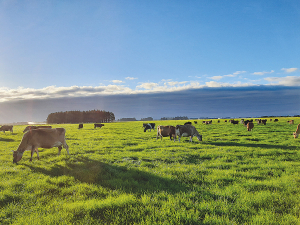Another Windfall for Fonterra Farmers, Unit Holders
Fonterra farmer shareholders and unit holders are in line for another payment in April.
 A new farmer movement is set to launch very soon and will be pushing for a different approach to tackling on-farm emissions.
A new farmer movement is set to launch very soon and will be pushing for a different approach to tackling on-farm emissions.
Rumours are circulating about a new farmer-led campaign aimed at challenging the current drive for taxing biogenic methane.
Rural News understands that this new farmer movement is set to launch very soon and will be pushing for a different approach to tackling on-farm emissions - especially in relation to methane.
It is understood the group will be promoting a 'methane accord', which it says will be a set of 'not negotiables' when it comes to analysing methane.
The group says its target audience is everyone - urban, rural, politicians (both outgoing and incoming). It also wants to ensure that the pressure goes on agri companies and co-operatives - such as Fonterra and Silver Fern Farm - to show their 'true colours' when it comes to pricing emissions.
"We have had enough of the Government and others in our midst - BLNZ, DairyNZ, Feds, Silver Fern Farms, Fonterra, ANZCO and Food and Fibre 'Leaders' Group - pretending to say all the right things but actually still fundamentally supporting the pricing of biogenic methane emissions," the group says.
It describes the current government and industry proposals to price agricultural emission via the He Waka Eke Noa accord as a plan to "self-sabotage" NZ's primary industry sectors.
Dairy Women's Network (DWN) has announced that Taranaki dairy farmer Nicola Bryant will join its Trust Board as an Associate Trustee.
Rural Women New Zealand (RWNZ) says it welcomes the release of a new report into pay equity.
Red meat exports to key quota markets enjoyed $1.4 billion in tariff savings in the 2024-25 financial year.
Remediation NZ (RNZ) has been fined more than $71,000 for discharging offensive odours described by neighbours as smelling like ‘faecal and pig effluent’ from its compositing site near Uruti in North Taranaki.
Two kiwifruit orchards in the Bay of Plenty and one in Northland are this year's finalists for the Ahuwhenua Trophy competition.
The Government's chief science advisor, Dr John Roche says the key objective for the science sector in the coming year is bedding down the reforms which sees the merger of the previous entities.

OPINION: A mate of yours truly reckons rural Manawatu families are the latest to suffer under what he calls the…
OPINION: If old Winston Peters thinks building trade relations with new nations, such as India, isn't a necessary investment in…